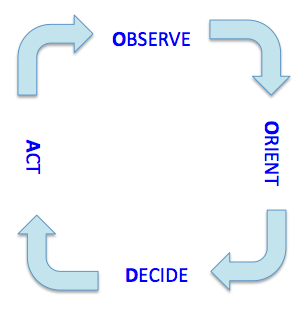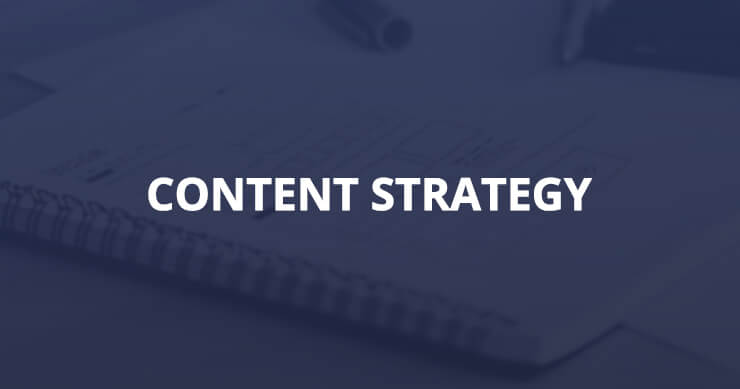Rhea here with some nerdy thoughts on decision-making.
Sometimes it’s difficult for me to decide what I want to eat for lunch. By comparison, making a large SEO strategy decision for a client or business decision for the company can feel downright crippling. What makes it easier for me to get through the tough decisions is the OODA loop, which I discovered after reading, Boyd: The Fighter Pilot Who Changed the Art of War and over coffee talk, Ric Dragon convinced me to share it with the rest of you! Hold tight, it’s worth it.
The book is the biography of Colonel John Boyd, arguably the greatest fighter pilot and one of the most brilliant military strategists who ever lived. I’m going to take a guess that most of you (like me) have never heard of Boyd or an OODA loop. So, why would I read the book? I had raving recommendations from five different men in my life and each said the same thing — good read, fascinating business applications.
It took the flight to the latest Pubcon Vegas for me to finally crack open the book and it may have been the fact that I was flying in the same air space that John Boyd once broke barriers in, but I couldn’t put it down. I’m not a military strategist or a philosopher, so I’m not even going to attempt to explain the finer points of Boyd’s OODA loop, but let’s try the basics and feel free to chime in, in the comments if you have a better understanding or interesting applications:
What does OODA loop mean?

In its earliest form Boyd used the OODA loop to explain why American fighter pilots consistently overtook technically superior enemy planes in the Korean War. The mechanics of the Russian MiG-15 should have made it the clear winner when it came to dog fights, but the inferior American planes had a 10:1 victory. What Boyd discovered was that American pilots were better equipped to observe-orient-decide-act on what was happening around them. Their training enabled them to get into their enemies “loop” faster and win because they could adapt more quickly even though they had a plane that on paper should have lost.
Since its inception the OODA loop has been applied to many industries. Venture Hacks wrote a post on the OODA loop and startups and it’s been covered by Fast Company.
As marketers and business owners we’re trying to gain an advantage over the competition. For us that competition can come in a variety of forms because of the complications we face with search engines — real world competitors are not always SERP competitors. For example, if a client sells crock pots and there are only a handful of high-quality crock pot makers in the world, the client would consider those makers to be their competition. But the SEO sees the competition as anyone out-ranking the site in the SERPs. This may include, but is not limited to — shopping sites, affiliates, directories, article sites, blogs, news, images, videos and the search engines themselves.
By understanding the competition and being able to execute the OODA loop, we can “win” the SEO battle. The tactics a search marketer employs may vary, but the concept remains the same. Results don’t happen until we make them happen.
Tom Critchlow recently did a Whiteboard Friday for SEOmoz on How to Make SEO Happen, which I found to be a simple breakdown of what can feel like a complex problem. His second point in the video was how important it is to create processes that make it easier to get things done. This is best accomplished by making things actionable.
Let’s try to do that here. Below are my action items for you if you want to improve your OODA loop in whatever situations may arise.
Get Trained
There’s nothing more frustrating than being faced with a decision that you don’t have the knowledge to address. This is where many novice and even seasoned search marketers get hung up. The industry is constantly changing, what are we doing to keep our SEO consulting brains in shape?
You don’t have to be an expert in everything, but know enough to stop being dangerous and know where you should turn for more information on a specific subject. Not sure where to start? You’re reading this post, so you must know about some of the best SEO blogs, subscribe to your favorite industry insiders, as well as, their sources (like Google’s Official Webmaster Central blog or Bing’s blogs).
Also, check out educational opportunities and certification programs like MarketingProfs University, Market Motive and Google Analytic’s Conversion University.
Develop your circle of trust. Is that a close group of other search marketers you trust? Maybe a local meetup group or professional association? Maybe it’s a virtual community like SEO Book, the SEO Dojo, Webmaster World.
Use the Best Tools
I use a lot of tools in my day and my Mac hates me for it. What makes my day easier? Let’s go with the most heavily used tools and services:
- Basecamp
- Raven SEO Tools
- WordPress and pretty much everything from Yoast
- Spyfu
- Xenu
- Excel
- Firefox and Chrome
- Google Webmaster Central
- Google Analytics
For the most part I love the tools we work with, but I’m always looking for new ones, because there’s nothing more frustrating and costly than having a tool I rely on crap out on me (I’m looking at you Google Docs and Quickbooks).
Which brings me to the most important (and cheesy) tool — our brains. If a tool isn’t working, fix it, create a better one or rethink the process. It’s very easy for us to get accustomed to doing things the same way we always have even if that method is absurd and costly. But, it’s impossible to make an informed decision if our tools are compromised or underperforming.
Recognize Mistakes
There’s been a lot of conversation around mistakes and accidental tweets lately. I won’t dwell on the subject, but there is no more pivotal time than when I recognize I’ve made a mistake and what I choose to do about it. Learn from the mistake. Implement change. Keep moving forward.
In an agency, we have to refine our process and the tools we use. Identify problems, train everyone on how to avoid them, setup editable SOPs, and ask everyone to share their discoveries. At an agency, we offer a collection of knowledge and experiences about our services that exceed that of potential clients. The ability to effectively communicate with our team about their experiences is priceless.
Trust Your Gut
I try not to rely on my personal gut when it comes to client strategies, but there are so many little decisions in my day that don’t give me a chance to slowly weigh my options. Those times are when all of that training and my gut kick into high gear and I have to blindly trust that I’m making the right decision. To accomplish a higher purpose, action has to take place and that action can be scary and/or liberating.
Here are some of my favorite “gut” reactions from the industry:
- Ian Laurie just wrote a post on the Potential Misery Index of Clients. He lists effective guidelines for assessing prospective clients. That’s his gut speaking and as another agency owner, I can absolutely sympathize with the list, but those are lessons many won’t trust until they’re in the same situation (been there, done that). It will be a costly lesson.
- Remember that circle of trust? Wil Reynolds is in mine. When he wrote about his hiring fails I should have listened up. I read the post and absorbed it, but I’ve always been that stubborn type who needs to feel the lesson before I get it. These days, Outspoken Media is “getting it” more often than not and that’s a good pattern. We have the most incredible team and resumes are flooding in from incredibly talented local marketers. It’s exciting and assures me that we’re getting better with our OODA loop.
What does your loop look like? Is it a loop or more of a brick wall where action slams to a halt? What can you do to gain that competitive advantage for your clients and/or your business?
Final thought:
A friend pointed me to a post by Tim Ferriss on 6 Formulas for More Output and Less Overwhelm and in reading the post I came across a mention of the “The Paradox of Choice.” I read this book several years back and it really hit home for me at the time in a silly way. I was shopping for a wedding dress. I wanted THE dress. I didn’t know what it was, but I knew light would shine down from heaven on me when I put it on. What Mr. Schwartz’s (yes, Barry Schwartz, no, not OUR Barry Schwartz) book helped me realize was that as “choice” grows, it may actually be harder to make a decision. We feel like we’re missing out on something or making a mistake. That paralysis strikes fear in us over something as simple as buying a dress or a box of cereal. Interesting stuff, which has sparked a lot of debate over the subject. What do you think?
If you’re really interested in this subject, do grab a copy of Boyd and check out Mr. Schwartz at TED:

